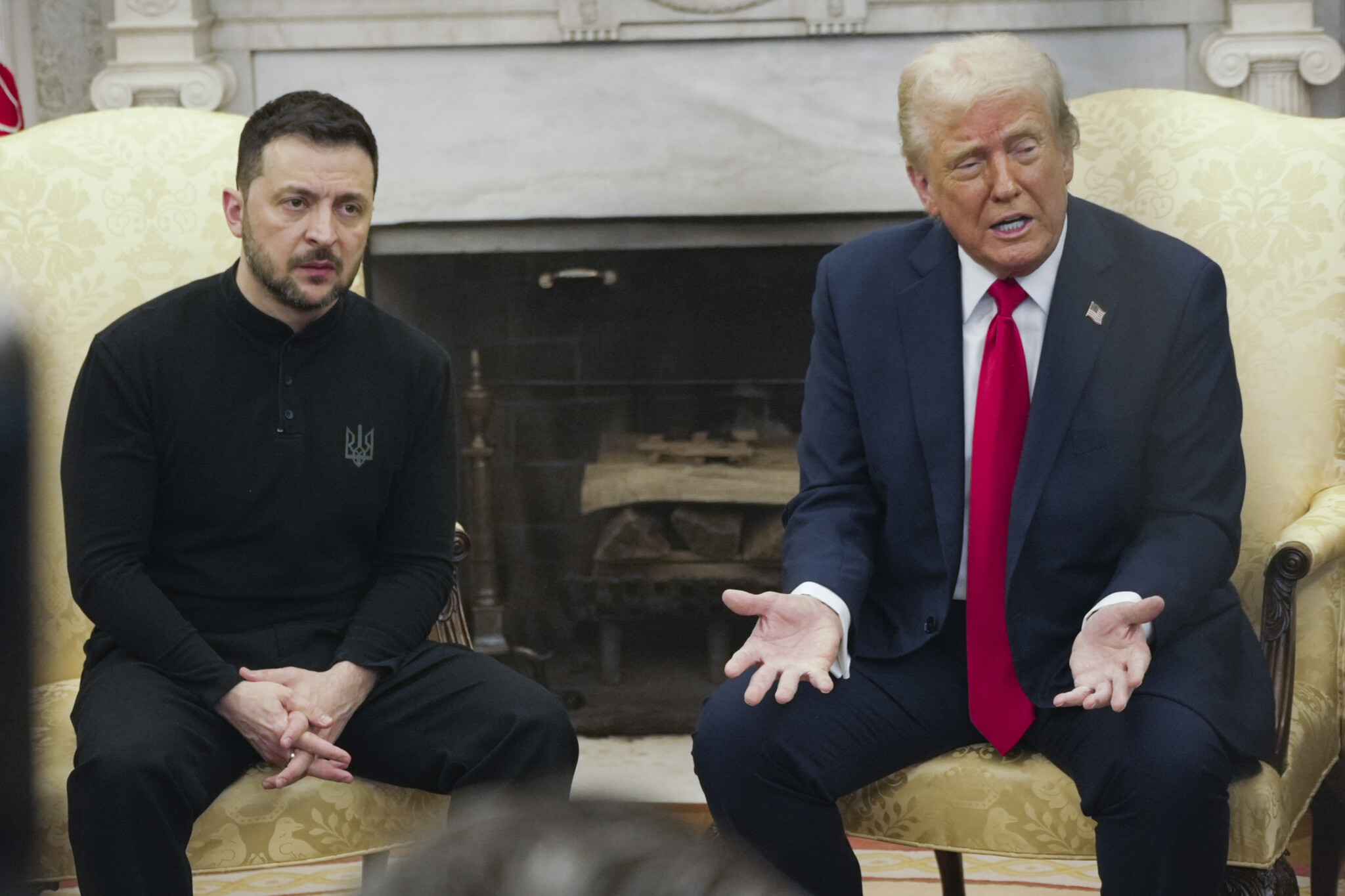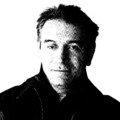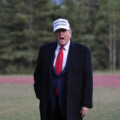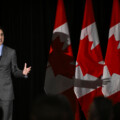
President Donald Trump with Ukrainian President Volodymyr Zelenskyy in the Oval Office at the White House, Feb. 28, 2025, in Washington. Mystyslav Chernov/AP Photo.
As the United States retreats from being a unipolar power, the prevailing global order is at a crossroads. For Canada, it’s time to start thinking about what comes next and what it means for Canadian policy. The Hub is running a new essay series to grapple with these seismic changes and offer a new clear-headed direction for Canadian foreign policy.
In this week’s Hub book review, Patrick Luciani examines Waste Land: A World in Permanent Crisis, by Robert Kaplan (Random House, 2025), a stark exploration of why the international world order seems to be coming apart.
When President Donald Trump and Vice President JD Vance tag-teamed Ukrainian President Volodymyr Zelensky into submission in the Oval Office on February 28, they brought the old-world order to an end. It was a moment for the history books.
Struggling with his English, Zelensky remarked on the vast ocean protecting the U.S. from foreign threats, implying that his own country lacked an ocean to shield it from Vladimir Putin. Trump, in his ignorance, had no idea what the Ukrainian president was talking about.
That was the moment I reflected on Robert Kaplan’s new book, Waste Land: A World in Permanent Crisis, and the writings of the Greek historian Thucydides, who taught that the world belongs to the strong and that the weak must succumb.
In the” Weimar Goes Global” chapter, Kaplan reminds us that contingencies shape the world. Just as Hitler’s ascent depended on Franz von Papen—a vain and superficial amateur horseman—suggesting to President Paul Hindenburg that Adolf Hitler could be controlled from within if appointed chancellor. With that fateful decision in 1932, Weimar’s house of cards crumbled.
Zelensky didn’t realize that an ocean no longer protected America. The spirit of Putinism had already crossed the Atlantic and was invited into the White House. Trump and Vance were advancing Vladimir Putin’s agenda and Zelensky wasn’t negotiating with the U.S.—he was negotiating with his nemesis.
Trump had most likely convinced Putin that he could easily persuade Zelensky to sign a deceptive critical minerals deal that would satisfy the Ukrainian leader’s demand for a security guarantee. Just as von Papen brought the devil into the German government, Trump was certain he could arrange a quick peace deal. It’s not a perfect analogy, contingencies never are, but it is close enough to draw lessons from history. When the deal fell apart, Trump ordered a pause on military aid to Ukraine—an astounding turn of international events. Even if the deal does eventually go through, Canada now realizes that its greatest friend and protector is its enemy.
Kaplan reminds us that the world is far more perilous than many believe. If anyone harboured any illusions that we still live in a world order dictated by a liberal rules-based system, that myth was shattered on February 24, 2022, when Russian tanks rolled into Ukraine. For 80 years, we believed we were living in an era of peace when in reality, we existed in a world of an “armed truce.” Look around, says Kaplan, and observe that the globe is overlaid with “areas of tension, raw intimidation, and military standoffs.”
It is a stark Hobbesian world with no “night watchman” to maintain peace. Conflicts have far-reaching effects now that we are tightly interwoven through globalization, technology, and social media. Actions in one part of the world quickly reverberate worldwide. And no one is coming to the rescue. Once a forum for serious debate, the UN is largely irrelevant in resolving conflicts.
The limited conflict between Ukraine and Russia devastated international energy and grain prices. Imagine the consequences if China decides to attack Taiwan. The supply chain disruptions would be far worse for the world’s economy.
Waste Land leaves little hope for a world teetering on ruin. Some optimists argue that human nature is becoming more pacified, feminized, and, therefore, less violent. That was the message by Harvard’s psychologist Steven Pinker in his book The Better Angels of Our Nature. Kaplan disagrees. He acknowledges that he cannot prove that human nature is less violent, but history tells us that human behaviour changes slowly, if at all. History is shaped by “vast impersonal forces” and the actions of charismatic leaders who resist humanity’s tendency to pacification. Kaplan reminds us that we have never experienced a century of continuous peace throughout human history.
Population growth rates may be declining, but absolute levels are still rising. This is stressing the globe’s resources, food production, and environment and raising the chances of war and conflict. Malthusianism may finally have the last word.
In the last chapter, “Crowds and Chaos,” Kaplan seeks insight from great thinkers and writers of the past, including Orwell, Huxley, Camus, and Spengler’s The Decline of the West, first published in 1918. The news he brings back, however, isn’t good. Kaplan especially reveres Alexander Solzhenitsyn and his study of Lenin’s endless cruelty, a man whom Solzhenitsyn described as a block of granite. One cannot help but see in Putin a direct descendant—a man who would send about a million men to their deaths without a moment’s hesitation. This is a reality that Zelensky understands, while the “illiterate man of history” sitting in the White House does not.
Waste Land is a stark examination of human nature inspired by T.S. Eliot’s poem. Kaplan reminds us that a historian’s role is to explain the world as it is, not as we would prefer it to be. Mark that dreadful day in Washington, D.C. when the world’s greatest democracy aligned itself with a tyrant to destroy freedom.











